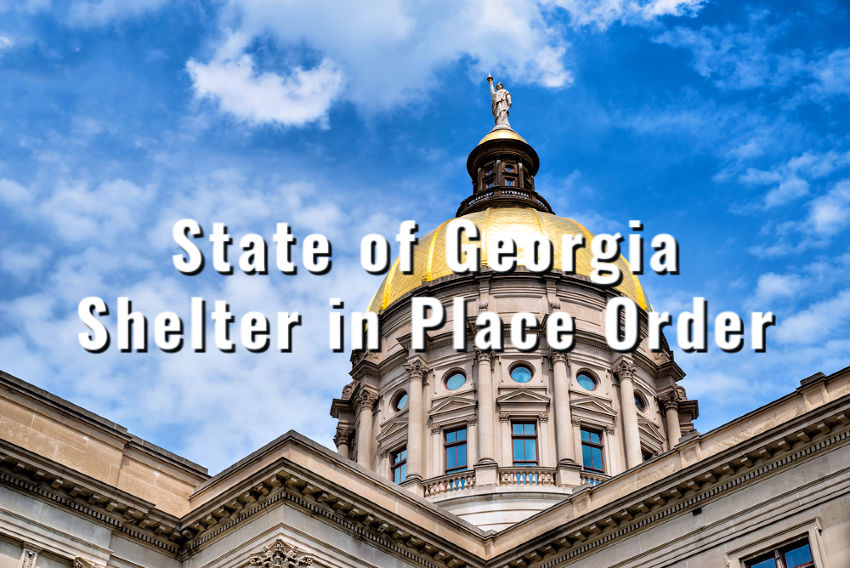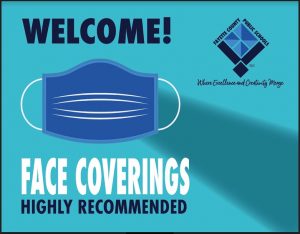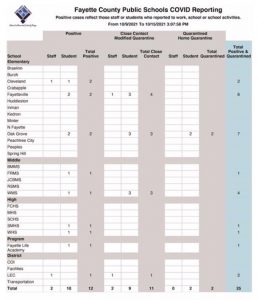UPDATED March 4 —10-day order supersedes all local rules; city police empowered to enforce compliance with governor’s order
Georgia Gov. Brian Kemp issued an executive order Thursday evening that supersedes all the city and county approaches to dealing with the Covid-19 pandemic.
The order requires everybody in the state to shelter in place and defines which types of business are critical infrastructure and which face limitations, including some that will be closed for 10 days.
[UPDATED INFORMATION] Violations will be treated as a misdemeanor. The rules in the order — except for business closures — are enforceable by all city, county and state law officers. According to the Peachtree City Police Department, that means that “municipal law enforcement agencies are empowered to enforce compliance with the original order. However, only certain agencies deputized by him may mandate the closure of businesses for violations of the order. As of now, that includes Sheriff’s Offices and certain state agencies.”
As of Friday afternoon, April 3, in addition to state officers, sheriffs and their deputies “are hereby authorized to enforce the closure of businesses, establishments, corporations, non-profit corporations, or organizations in accordance with” the governor’s 10-day shelter-in-place order.
Gov. Kemp instructed the sheriffs to handle their closure authority with care. “The sheriffs enforcing this order should take reasonable steps to provide notice and a reasonable time to allow … the opportunity to comply with directions from sheriffs or their deputies prior to mandating closure,” Gov. Kemp’s order said.
[UPDATED INFORMATION] The state order overrules all local orders about sheltering in place and which businesses must close or can stay open. Even locally, Fayetteville’s emergency orders differed from Peachtree City’s, and Tyrone’s from both. As of now, those city emergency orders responding to the Covid-19 pandemic are nullified wherever they conflict with the governor’s order.
Effective at 6 p.m. Friday, April 3, the governor ordered mandatory closures of bars nightclubs, fitness centers, bowling lanes, etc. By state rule, dine-in services at restaurants and private social clubs are closed to the public, with some big exceptions. Still allowed are take-out; curbside pick-up; delivery; and dine-in services at hospitals, healthcare facilities, nursing homes, or other long-term care facilities.
Barber shops, hair salons, beauty shops, tattoo parlors and the like are out of luck for the 10-day shutdown period.
The order allows the general public to perform necessary travel (as defined). Here’s what the state says: “You can go to the grocery store, medical appointments, and the pharmacy. You can go pick-up food or have food delivered to your house. You can leave your house to buy supplies to clean or maintain your house. You can go outside to exercise. You can also leave your house in an emergency.
“The key takeaway is that you need to stay in your house as much as possible, but we recognize there are circumstances when you will need to leave. Keep those circumstances rare, consolidate trips as much as possible, and use take-out, curbside pick-up, and delivery services whenever possible to prevent the spread of COVID-19.”
Below are the state’s answers to questions about what the governor’s order means:
How long does Governor Kemp’s Executive Order last?
Governor Kemp’s Executive Order is effective starting at 6 PM on Friday, April 3, 2020 through 11:59 PM on Monday, April 13, 2020.
What businesses and professionals must cease in-person operations and close to the public during this time?
• Bars
• Nightclubs
• Gyms
• Fitness centers
• Bowling allies
• Theaters
• Live performance venues
• Operators of amusement parks
• Dine in-services at restaurants and private social clubs [Exceptions: Take-out; curbside pick-up; delivery; and dine-in services at hospitals, healthcare facilities, nursing homes, or other long-term care facilities]
• Estheticians (e.g., waxing, threading, eyelash extensions, cosmetic treatments)
• Hair designers
• Body art studios (commonly known as tattoo parlors)
• Beauty shops and salons (including home beauty shops and salons)
• Barber shops (including home barber shops)
• Cosmetology schools
• Hair design schools
• Barbering schools
• Esthetics schools
• Nail care schools
• Licensed massage therapists
All other entities may continue to operate subject to specific restrictions. Those restrictions vary depending on whether your entity is Critical Infrastructure.
Is my entity critical infrastructure?
What is Critical Infrastructure?
Critical Infrastructure: For Critical Infrastructure entities, if your business or organization will continue in-person operations, the state encourages implementation of sixteen (16) requirements. The definition of Critical Infrastructure and the sixteen (16) recommendations are listed [below].
Critical Infrastructure means a businesses, establishments, corporations, non-profit corporations, and organizations as defined by the U.S. Department of Homeland Security as “essential critical infrastructure workforce,” in guidance dated March 19, 2020, and revised on March 28, 2020, and those suppliers which provide essential goods and services for the critical infrastructure workforce as well as entities that provide legal services, home hospice, and non-profit corporations or non-profit organizations that offer food distribution or other health or mental health services. The operation of Critical Infrastructure shall not be impeded by county, municipal, or local ordinance.
Critical Infrastructure continuing to use in-person operations shall implement measures which mitigate the exposure and spread of COVID-19 among its workforce.
Non-Critical Infrastructure
If your entity is not Critical Infrastructure, you shall follow the Social Distancing Rule, only engage in Minimum Basic Operations, and meet twenty (20) requirements.
How does the Order apply to individuals and families?
Basic Rule: All residents and visitors of Georgia are required to shelter in place in their residences from 6 PM on Friday, April 3, 2020 to 11:59 PM on Monday, April 13, 2020. “Shelter in place” means remaining in their residences and taking every possible precaution to limit social interaction to prevent the spread or infection of COVID-19.
Are there exceptions to the Basic Rule?
Yes. A resident or visitor of Georgia is not required to shelter in place if they are:
1. Engaging in Essential Services
2. Working in Critical Infrastructure
3. Engaging in Minimum Basic Operations
4. Performing Necessary Travel
Essential Services means obtaining necessary supplies and services for your household, engaging in activities essential for the health and safety of your household, and engaging in outdoor exercise activities so long as you have at least six (6) feet between people who do not live in your household.
You can go to the grocery store, medical appointments, and the pharmacy. You can go pick-up food or have food delivered to your house. You can leave your house to buy supplies to clean or maintain your house. You can go outside to exercise. You can also leave your house in an emergency.
The key takeaway is that you need to stay in your house as much as possible, but we recognize there are circumstances when you will need to leave. Keep those circumstances rare, consolidate trips as much as possible, and use take-out, curbside pick-up, and delivery services whenever possible to prevent the spread of COVID-19.
Necessary Travel means the travel required for someone to conduct or participate in Essential Services, Minimum Basic Operations, or work for Critical Infrastructure.
How does this order apply to local governments?
No county or municipal government is allowed to have more than ten (10) people gathered in a single location unless there is at least six (6) feet between each person at all times. The Governor’s Order supersedes all local ordinances to the extent that they conflict and states that no local ordinance can be more restrictive or less restrictive.
What are Minimum Basic Operations?
That Minimum Basic Operations are limited to:
1. The minimum necessary activities to maintain the value of a business, establishment, corporation, non-profit corporation, or organization, provide services, manage inventory, ensure security, process payroll and employee benefits, or for related functions. Such minimum necessary activities include remaining open to the public subject to the restrictions of this Order.
2. The minimum necessary activities to facilitate employees or volunteers being able to work remotely from their residences or members or patrons being able to participate remotely from their residences.
3. Instances where employees are working outdoors without regular contact with other persons, such as delivery services, contractors, landscape businesses, and agricultural industry services.
Below is the entire executive order by Gov. Kemp:
EXECUTIVE ORDER TO ENSURE A SAFE & HEALTHY GEORGIA
On March 14, 2020, due to the impact of COVID-19 on the State of Georgia, I issued Executive Order No. 03.14.20.01, declaring a Public Health State of Emergency in Georgia; and
The Georgia General Assembly concurred with Executive Order 03.14.20.01 by joint resolution on March 16, 2020; and
The number of COVID-19 cases in Georgia continues to rise; and
The Georgia Department of Public Health has determined that COVID-19 is spreading throughout communities, requiring the implementation of certain restrictions to limit the spread; and
The Centers for Disease Control and Prevention has determined that older adults, people of any age who have serious underlying medical conditions, and certain other people groups may be at higher risk for more serious complications from COVID-19; and
Code Section 38-3-51(c)(4) vests the Governor with the power to perform and exercise such other functions, powers, and duties as may be deemed necessary to promote and secure the safety and protection of the civilian population; and
Code Section 38-3-51(d)(1) vests the Governor with the power to suspend any regulatory statute prescribing the procedures for conduct of state business, or the orders, rules, or regulations of any state agency if strict compliance with any statute, order, rule, or regulation would in any way prevent, hinder, or delay necessary action in coping with the emergency or disaster; and
Code Sections 31-2A-4 and 31-12-4 vests the Department of Public Health with the power to segregate and isolate certain individuals with certain communicable diseases or conditions when said individuals’ exposure to the general population is likely to endanger the health of others; and
In consultation with the Governor’s Coronavirus Task Force and health and emergency preparedness officials, I have determined that the following temporary actions are necessary and appropriate to protect the health, safety, and welfare of Georgia’s residents and visitors.
Now, THEREFORE, PURSUANT TO AFOREMENTIONED GEORGIA LAW AND THE AUTHORITY VESTED IN ME AS GOVERNOR OF THE STATE OF GEORGIA, IT IS HEREBY
All residents and visitors of the State of Georgia shall practice social distancing and sanitation in accordance with this Order and guidelines published by the Centers for Disease Control and Prevention.
IT IS FURTHER ORDERED
No business, establishment, corporation, non-profit corporation, organization, or county or municipal government shall allow more than ten (10) persons to be gathered at a single location if such gathering requires persons to stand or to be seated within six (6) feet of any other person. This provision shall not apply to cohabitating persons outside of their homes, family units or roommates residing together in private homes, or entities defined as “Critical Infrastructure” by this Order.
IT IS FURTHER ORDERED
That as used in this Order, the term “single location” shall be interpreted to mean a space where all persons gathered cannot maintain at least six (6) feet of distance between themselves and any other person. The term “single location” shall not include private residences.
IT IS FURTHER ORDERED
That all residents and visitors of the State of Georgia are required to shelter in place within their homes or places of residence, meaning remaining in their place of residence and taking every possible precaution to limit social interaction to prevent the spread or infection of COVID-19 to themselves or any other person, unless they are:
1. Conducting or participating in Essential Services;
2. Performing Necessary Travel;
3. Are engaged in the performance of, or travel to and from, the performance of Minimum Basic Operations for a business, establishment, corporation, non-profit corporation, or organization not classified as Critical Infrastructure; or
4. Are part of the workforce for Critical Infrastructure and are actively engaged in the performance of, or travel to and from, their respective employment.
IT IS FURTHER ORDERED
That Essential Services permitted pursuant to the provisions of this Order are limited to the following:
1. Obtaining necessary supplies and services for family or household members, such as food and supplies for household consumption and use, medical supplies or medication, supplies and equipment needed to work from home, and products needed to maintain safety, sanitation, and essential maintenance of the home or residence. Preference should be given to online ordering, home delivery, and curbside pick-up services wherever possible as opposed to in-store shopping.
2. Engaging in activities essential for the health and safety of
family or household members, such as seeking medical, behavioral health, or emergency services.
3. Engaging in outdoor exercise activities so long as a minimum distance of six (6) feet is maintained during such activities between all persons who are not occupants of the same household or residence.
IT IS FURTHER ORDERED
That Necessary Travel permitted under this Order is limited to such travel as is required to conduct or participate in Essential Services, Minimum Basic Operations, or Critical Infrastructure as defined by this Order.
IT IS FURTHER ORDERED
That Minimum Basic Operations are limited to:
1. The minimum necessary activities to maintain the value of a business, establishment, corporation, non-profit corporation, or organization, provide services, manage inventory, ensure security, process payroll and employee benefits, or for related functions. Such minimum necessary activities include remaining open to the public subject to the restrictions of this Order.
2. The minimum necessary activities to facilitate employees or volunteers being able to work remotely from their residences or members or patrons being able to participate remotely from their residences.
3. Instances where employees are working outdoors without regular contact with other persons, such as delivery services, contractors, landscape businesses, and agricultural industry services.
IT IS FURTHER ORDERED:
That all businesses, establishments, corporations, non-profit corporations, or organizations that are not Critical Infrastructure shall only engage in Minimum Basic Operations as defined in this Order during the effective dates of this Order. Such entities shall also implement measures which mitigate the exposure and spread of COVID-19 among its workforce. Such measures shall include the following:
1. Screening and evaluating workers who exhibit signs of illness, such as a fever over 100-4 degrees Fahrenheit, cough, or shortness of breath;
2. Requiring workers who exhibit signs of illness to not report to work or to seek medical attention;
3. Enhancing sanitation of the workplace as appropriate;
4. Requiring hand washing or sanitation by workers at appropriate places within the business location;
5. Providing personal protective equipment as available and appropriate to the function and location of the worker within the business location;
6. Prohibiting gatherings of workers during working hours;
7. Permitting workers to take breaks and meals outside, in their office or personal workspace, or in such other areas where proper social distancing is attainable;
8. Implementing teleworking for all possible workers;
9. Implementing staggered shifts for all possible workers;
10. Holding all meetings and conferences virtually, wherever possible;
11. Delivering intangible services remotely wherever possible;
12. Discouraging workers from using other workers’ phones, desks, offices, or other work tools and equipment;
13. Prohibiting handshaking and other unnecessary person-to? person contact in the workplace;
14. Placing notices that encourage hand hygiene at the entrance to the workplace and in other workplace areas where they are likely to be seen;
15. Suspending the use of Personal Identification Number (“PIN”) pads, PIN entry devices, electronic signature capture,
and any other credit card receipt signature requirements to the extent such suspension is permitted by agreements with credit card companies and credit agencies;
16. Enforcing social distancing of non-cohabitating persons while present on such entity’s leased or owned property;
17. For retailers and service providers, providing for alternative points of sale outside of buildings, including curbside pick-up or delivery of products and/or services if an alternative point of sale is permitted under Georgia law;
18. Increasing physical space between workers and customers;
19. Providing disinfectant and sanitation products for workers to clean their workspace, equipment, and tools;
20. Increasing physical space between workers’ worksites to at least six (6) feet.
IT IS FURTHER ORDERED:
The term “Critical Infrastructure” shall refer to businesses, establishments, corporations, non-profit corporations, and organizations as defined by the U.S. Department of Homeland Security as “essential critical infrastructure workforce,” in guidance dated March 19, 2020, and revised on March 28, 2020, and those suppliers which provide essential goods and services to the critical infrastructure workforce as well as entities that provide legal services, home hospice, and non-profit corporations or non-profit organizations that offer food distribution or other health or mental health services. The operation of Critical Infrastructure shall not be impeded by county, municipal, or local ordinance.
Critical Infrastructure that continues in-person operation during the effective dates of this Order shall implement measures which mitigate the exposure and spread of COVID-19 among its workforce. Such measures may include, but shall not be limited to:
1. Screening and evaluating workers who exhibit signs of illness,
such as a fever over 100.4 degrees Fahrenheit, cough, or shortness of breath;
2. Requiring workers who exhibit signs of illness to not report to work or to seek medical attention;
3. Enhancing sanitation of the workplace as appropriate;
4. Requiring hand washing or sanitation by workers at appropriate places Yl>ithin the business location;
5. Providing personal protective equipment as available and appropriate to the function and location of the worker within the business location;
6. Prohibiting gatherings of workers during working hours;
7. Permitting workers to take breaks and lunch outside, in their office or personal workspace, or in such other areas where proper social distancing is attainable;
8. Implementing teleworking for all possible workers;
9. Implementing staggered shifts for all possible workers;
10. Holding all meetings and conferences virtually, wherever possible;
11. Delivering intangible services remotely wherever possible;
12. Discouraging workers from using other workers’ phones, desks, offices, or other work tools and equipment;
13. Providing disinfectant and sanitation products for workers to clean their workspace, equipment, and tools;
14. Prohibiting handshaking and other unnecessary person-to-person contact in the workplace; and
15. Placing notices that encourage hand hygiene at the entrance to the workplace and in other workplace areas where they are likely to be seen; and
16. Suspending the use of Personal Identification Number (“PIN”) pads, PIN entry devices, electronic signature capture, and any other credit card receipt signature requirements to the extent such suspension is permitted by agreements with credit card companies and credit agencies.
IT IS FURTHER ORDERED:
That the Georgia Department of Economic Development is authorized to issue guidance to any business, corporation, organization, or industry trade group regarding its status as Critical Infrastructure. This guidance shall not require a finding of fact but shall be in writing and shall be considered a final agency action for the purpose of proceedings under Code Section 50-13-19.
IT IS FURTHER ORDERED
All restaurants and private social clubs shall cease providing dine-in services. Takeout, curbside pick-up, and delivery are permitted in accordance with the provisions of this Order.
This provision shall not limit the operation of dine-in services in hospitals, healthcare facilities, nursing homes, or other long-term care facilities; however, to the extent possible, such facilities should offer in-room dining.
IT IS FURTHER ORDERED
That all gyms, fitness centers, bowling alleys, theaters, live performance venues, operators of amusement rides as defined by Code Section 25-15-51, body art studios permitted pursuant to Code Section 31-40-2, businesses registered pursuant to Code Sections 43- 10-11 and 43-10-18, estheticians as defined by Code Section 43-10- 1(8), hair designers as defined by Code Section 43-10-1(9), persons licensed to practice massage therapy pursuant to Code Section 43- 24A-8, and businesses which possess a license to operate as or otherwise meet the definition of “bar” as defined by Code Section 3- 1-2(2.1), shall cease in-person operations and shall close to the public while this Order is in effect.
IT IS FURTHER ORDERED:
That persons required to shelter in place under any provision of this Order shall not receive visitors, except as follows:
1. Visitors providing medical, behavioral health, or emergency services or medical supplies or medication, including home hospice;
2. Visitors providing support for the person to conduct activities of daily living or instrumental activities of daily living;
3. Visitors providing necessary supplies and services, such as food and supplies for household consumption and use, supplies and equipment needed to work from home, and products needed to maintain safety, sanitation, and essential maintenance of the home or residence; or
4. Visitors received during end-of-life circumstances.
To the extent practicable under the circumstances, visitors shall maintain a minimum distance of six (6) feet between themselves and all other occupants of the person’s home or residence. Any visitors visiting for the sole purpose of delivering medication, supplies, or other tangible goods shall, to the extent practicable, deliver such items in a manner that does not require in-person contact or require the deliverer to enter the person’s home or residence.
IT IS FURTHER ORDERED
That the provisions of this Order related to visitors listed in the immediately preceding paragraph shall be strictly enforced against nursing homes or other long-term care facilities, including inpatient hospice, assisted living communities, personal care homes, intermediate care homes, community living arrangements, and community integration homes.
IT IS FURTHER ORDERED
That an exception to any shelter-in-place requirement set forth hereunder applies in the event of an emergency. In such cases, persons are encouraged to leave their homes or residences and shelter in place in accordance with the rules included in this Order at a safe alternate location. Persons experiencing homelessness are urged to obtain shelter and to contact governmental and other entities for assistance.
IT IS FURTHER ORDERED:
That the Department of Public Health, the Department of Public Safety, or any other state department or state officer deputized by the Governor or the Georgia Emergency Management and Homeland Security Agency are, after providing reasonable notice, authorized to mandate the closure of any business, establishment, corporation, non-profit corporation, or organization not in compliance with this Order for a period not to extend beyond the term of this Order.
IT IS FURTHER ORDERED
That the Adjutant General of the Georgia National Guard and the Commissioner of the Department of Public Safety shall provide resources as requested to assist in the enforcement of this Order.
IT IS FURTHER ORDERED
That pursuant to Code Section 38-3-51, the powers of counties and cities conveyed in Titles 36 and 38, including those specific powers enumerated in Code Sections 36-5-22.1 and 36-35-3 are hereby suspended to the extent of suspending enforcement of any local ordinance or order adopted or issued since March 1, 2020, with the stated purpose or effect of responding to a public health state of emergency, ordering residents to shelter-in-place, ordering a quarantine, or combatting the spread of coronavirus or COVID-19 that in any way conflicts, varies, or differs from the terms of this Order. Enforcement of all such ordinances and orders is hereby suspended and no county or municipality shall adopt any similar ordinance or order while this Order is in effect, except for such ordinances or orders as are designed to enforce compliance with this Order.
IT IS FURTHER ORDERED
That if one or more of the provisions contained in this Order shall conflict with the provisions of any previous Executive Order or Agency Administrative Order, the provisions of this Order shall control. Further, in the event of any conflict, the provisions of any quarantine or isolation Order issued to a specific person by the Department of Public Health shall control.
IT IS FURTHER ORDERED:
That nothing in this Order shall be construed to suspend or limit the sale, dispensing, or transportation of firearms or ammunition, or any component thereof.
IT IS FURTHER ORDERED
That pursuant to Code Section 38-3-7, any person who violates this Order shall be guilty of a misdemeanor. Officials enforcing this Order should take reasonable steps to provide notice prior to issuing a citation or making an arrest.
IT IS FURTHER ORDERED
This Order rescinds and replaces Executive Order 03.23.20.01.
IT IS FURTHER ORDERED
That if one or more of the provisions contained in this Order shall be held to be invalid, in violation of the Georgia Constitution, in violation of Georgia law, or unenforceable in any respect, such invalidity, violation, or unenforceability shall not affect any other provisions of this Order, but, in such case, this Order shall be construed as if such invalid, illegal, or unenforceable provision had never been contained within the Order.
IT IS FURTHER ORDERED: All provisions of the Order shall become effective for a period beginning at 6:00 P.M. on Friday, April 3, 2020, and expiring at 11:59 P.M. on Monday, April 13, 2020.
This 2nd day of April 2020, at 3:12 P.M.
GOVERNOR BRIAN KEMP












Leave a Comment
You must be logged in to post a comment.